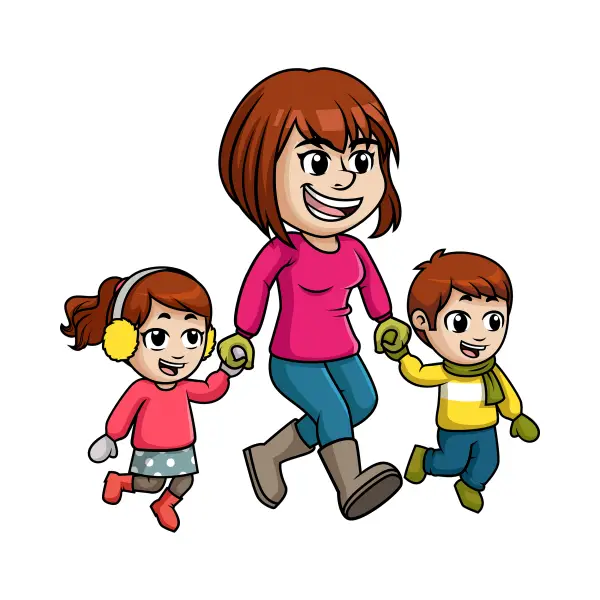
The question for many newlyweds is how many kids do you want or just as likely, when are you having kids? So how should you respond? What are things that affect your decision regarding children?
Thinking about how many kids you want is monumental. Factors affecting a decision are: spouse; money; religion; life style; or even profession. While research is debatable for both big and small families, having children is time-sensitive, so it should be considered thoughtfully.
It may seem surprising that I wasn’t always on board with having multiple children. We took 4 years before deciding to have our second and then another 4 years until having our third and fourth (twins). Now that our children are grown, I wish we’d had more.
This is just one example of how thoughts of having children can change as you grow older, though your window of opportunity doesn’t.
Contents
How Many Kids Should We Have?
It’s a giant leap to go from one child to two. In fact, I once heard someone say ‘going from one to two is like going from one to 100…but going from two to three is like going from…two to three.’ Well, why is that? And what should you consider when deciding how many kids to have?
When a couple ponders how many kids we should have, they need to consider the purpose of having children. Though some research show drawbacks to having children, it also has one significant finding: most parents say having children makes life meaningful, and truly, that’s the purpose of life.
So when thinking about how many kids to have, think carefully, but in this case, there really aren’t second chances.
For a number of reasons, many women in recent years have put off having kids, but not necessarily intending for forever. But if you wait too long, that’s what happens.
As a teacher, I worked with so many women over 40 who regret the decision to wait to have kids. To be clear, almost every single woman over 40 without children at one particular school where I worked had experienced miscarriage in their later years. A few opted for adoption, but for some, adoption wasn’t an option (due to money, health, and a number of other complex issues making them less likely to be chosen as adoption-worthy).
Questions to Consider When Answering ‘How Many Kids Should We Have?’:
- Why do you want children?
- Have you made a plan to care for them?
- Can you support one or more properly? (Keeping in mind that support goes beyond money.)
- Have you looked at the short-term and long-term plan?
- Are both parents on board and in sync with raising children?
Can A Family Be Too Big?

In the era of reality TV, several shows based on large families such as Jon and Kate Plus 8, 19 and Counting, and Welcome To Plathville give viewers a glimpse into large family living. But to be honest, these shows probably make most believe families can be too big. But can a family really be too big?
As long as parents are diligent in their parenting role, a family cannot be too big. This means parents care and provide for their children and that children are supervised and able to grow in a safe, healthy home. When parents don’t fulfill their role properly, then large families can be harmful.
Modern technology and social media have put extremely large families in the spotlight, almost like a carnival exhibit with the bearded lady or world’s smallest man. However, some large families have voluntarily subjected their families to the limelight in order to share their positive perspective, enlighten critics, and discredit misconceptions.
One such family is the Derricos. Presently, they have over ten children (no spoilers here!) and are enjoying popularity on TLC and social media from sharing the daily life of their extra-large sized family. For the Derricos, how many kids to have is easy! It’s left up to God, in their words.
Although they say it’s a simple decision for them to have kids, it hasn’t all been rosy (the family deals with trauma in recent episodes). Nevertheless, it’s evident, from the outside anyway, that this is a loving, caring family and judging by their children’s easy, flashy smiles, who could argue against this big, happy family?
Well, some proponents of smaller families can, as they tout evidence from studies that suggest smaller families are more ideal.
For instance, a 2018 Australian study said that having children negatively impacts parental mental health. As well, another study found a correlation between declining intelligence in children in families of four or more children. And finally, there’s one 2005 study that found that families with four or more children had a greater risk of childhood accidents due to lack of supervision, and also found a delay in rapidity of seeking medical attention.
However, this 2017 German study found the margin of difference in intelligence of first-born versus later born children of families with four or more “not strong” and in fact, they were able to show that often times in larger families the younger child actually ends up rating higher on IQ tests. They proposed that this suggests the intelligence difference is really related more to early childhood attention rather than anything else.
As well, in contrast to some studies, this January 2019 study found that being part of a large family is significantly effective in reducing stress and job burnout for adult individuals. However, a caveat is that the study was conducted in Nigeria where traditional family values are strong, such as providing mutual support and loyalty.
Because of this, researchers noted results may not be the same in places where family ties are not as fundamentally deep. However, this goes to show that when family is valued and prioritized, individuals benefit emotionally and professionally, not the other way around.
Suggestions for related reading:
- Family More Important Than Friends? (Friends Are Overrated)
- What to Know About Kids Visiting Grandparents’ House
- Considering Moving Away From Elderly Parents? Not Worth It!
The Waltons, Big TV Family Set in the 30s & 40s
Probably one of the first big families depicted on TV and still well-known today are the Waltons. This family consisted of two grandparents living with their son and daughter-in-law plus their seven children in a big farmhouse on a mountain in Virginia.
The Waltons enjoyed 9 long seasons and 212 episodes (with seasons running much longer then than now). Though the Waltons were described as a poor family and didn’t have many ‘extras’ in life, they were also shown as loving, kind, generous, and supportive.
This family program showed that despite the monetary constraints of having a large family, there are other benefits that made it worth it.
The Brady Bunch– Big TV Family of the 70s
The Brady Bunch began in 1969 and was different than The Waltons in that it was one of the first TV shows about a blended family. Both parents had lost a spouse and each had three children.
Although the TV show never explains how Mike and Carol met, they did deal with some concerns of ‘evil stepmother’ and worries that children of blended families may face.
After a few early episodes about coming together, the Brady bunch was one big, happy family and never dealt with issues of being blended again. Instead, it mostly had episodes about growing up and dealing with school and sibling rivalries and resolving situations around that.
One infamous and often spoofed episode deals with middle-child Jan’s jealousy of super-popular and pretty(ier?) older sister, Marcia. The line “Marcia, Marcia, Marcia” is synonymous with envy for those who grew up watching The Brady Bunch.
Eight Is Enough– TV’s Big Family That Took Us Into the 80s
And finally, there’s Eight is Enough, which began in 1977 about a two-parent family with 8 children. And judging by the title, 8 children is enough for this large family.
This show wasn’t really about having a large family as it was more about weekly spotlights on the individual escapades and happenings of certain family members, varying week-to-week. Then, they’d all come together for dinners, or late night talks, and it was evident that family support and loyalty were important values to the Bradfords.
Though the show isn’t as iconic as The Waltons and The Brady Bunch, for those who grew up in the late 70s and early 80s, Eight is Enough is still quite memorable.
Can A Family Be Too Small?
In contrast to reality TV’s fascination with large families, there is a rising number of one or two child families in real life. What are the ramifications of this change? Can a family be too small?
Weighing the risks and benefits of fewer children should give caution to a family being too small. Though research purports one-child families have less job stress and more money, families with multiple children rate themselves happier and more fulfilled.
There are some families like the Weidners, featured on the Health Science Channel, who say they deliberately chose to have a small family with just one child so they can provide extra attention and benefits. They say it affords them opportunities as a family they couldn’t have with a bigger family.
Then, there is the example of famous actress Mayim Bialik who said she initially wanted 11 children. After her second, however, she (and her husband) changed their minds about a large family. She explained this was in part due to the exhausting demands of her two children and to provide them with the amount of support they required.
There is research to support benefits of having a small family.
Some studies like this one from Penn State (2006) show that having one child makes parents feel happy, but effects are different upon having a second child. Dads’ happiness factor doesn’t change much, while mothers ratings of happiness decrease the more children they have.
Another study (from 2012) proposes having small families due to negative effects large families have on food security. And as stated earlier, some studies found evidence for higher IQ and academic potential in children of small families.
Some possible advantages for having small families:
- Better academic records for only children (or less children)
- Easier to provide attention to only children (or less children)
- More money because there are less people to provide for
- It is easier for both parents to have a career since there is less demand for childrearing.
- Less/no sibling rivalry.
However, it must be noted that even though common perception is that small families experience less stress and more money, among other positives, the research cited to support this is debatable at best, and corresponding research to refute each study can also be found.
So regardless of one study or another, couples should think long and hard about their decision for family size.
Why Do People Want Kids?

The USDA estimates the current cost of raising a child from birth to 18 years old is approximately $12,980 per year (obviously excluding outside childcare, private schooling, or other nonessentials.) With the base cost of children so high, it doesn’t make financial sense for most couples to even start a family. So, why do people want kids?
People want kids for a variety of reasons. From carrying on the family name to having someone to love to give meaning to one’s life to following religious tenets, the reasons for choosing to have kids are strong despite the risks attached.
Perhaps the best way to understand just why people have kids is to listen to them directly. Here are some quotes from a few famous people who also happen to be parents.
“Having children is my greatest achievement. It was my savior. It switched my focus from the outside to the inside. My children are gifts, they remind me of what’s important.”
-Elle MacPherson, model and actress
“Everything I thought I’d hate about having children – the crying, the screaming – nothing fazes me. I love it all, and it’s relaxed me.”
-Elton John, singer
“Pregnancy and motherhood are the most beautiful and significantly life-altering events that I have ever experienced.”
-Elisabeth Hasselbeck, TV personality
“Never is a man more of a man than when he is the father of a newborn.”
-Matthew McConaughey, actor
As some of these quotes relay, becoming a parent is one way to express love, truly the ultimate love due to the sacrifices parents make when bringing another life into the world. From finances to time, parents sacrifice big and small for their children.
Others choose to become parents to carry on their legacy. It’s not only a way to carry on your family name, but also your values and beliefs. There’s certainly something humbling, and also inspiring, about studying your genealogy such as AncestryDNA or 23 and Me (both available at Amazon), which may contribute to having your own children.
Then, there are those like the Derricos, who see having children as part of their religious faith. Personally, as Catholics, we see having children as a fundamental part of our lives, a true vocation. It’s a blessing to be a parent for us.
Is It Okay To Regret Having A Child?
Have you ever bought something and immediately regretted it? Or done something, like cut your hair or get a tattoo, and wish you could turn back time? Well, kids are not items to buy or like hair or tattoos, yet sometimes they can be quite awful. In that case, is it okay to regret having a child…at least for a little while?
It’s not okay to regret having a child because that’s essentially wishing the child dead. Having a fleeting negative thought during time of stress is only human, but parents should be cautious against harboring regret. Instead, focus on constructive work towards building a healthy family dynamic.
I don’t think there are any parents who haven’t gotten frustrated or yelled at their kids at least once in their life. Yet, I also think I’d be hard-pressed to find a parent to say they regret having their child. Why is that?
For good reason, it’s taboo to say you regret your child. The reason for this stigma is because it’s outside of the norm, as it’s not profitable for civilized society. Essentially, it’s disordered.
Parents, out of all the people of the world, should be counted on to love and care for, and want, their children. However, we know that’s not reality. There are plenty of parents who abandon their children, and just as unfortunate, there are parents who neglect their children.
Sometimes this is because parents are ill-equipped to ‘parent.’ They lack emotional and cognitive skills to do it properly. In cases like this, parents need extended family support to step in, or even outside support through therapy. In extreme situations, parents may relinquish their parenting rights.
However, all of these examples are outliers. The ‘norm’ is that parents have moments of frustration with their children, and may act out with an outburst like a yell or glare. These are moments in between all the other ones that make parenting special. And parents shouldn’t feel like moments like these make them regret their children.
Special Note: If as a parent you regret your children, seek support from your clergy or extended help.
Wrapping Up How Many Kids Do You Want
To conclude, deciding how many kids to have is something that can be difficult for some, and easy for others. Regardless of your outlook, it should be taken seriously. Being a parent is the most important ‘job’ in the world!
It is the job of a parent to sacrifice for their kids, so the trials and hardships of a large family should not deter plans for having a brood of your own. We have four, and through all the uphill climbs, it has been a true honor and pleasure.
For further reading, I highly recommend these articles:
